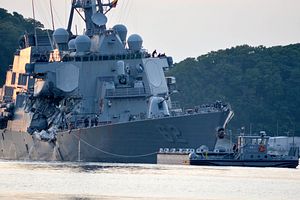Following the conclusion of a U.S. Navy investigation, the former captains of the USS Fitzgerald and USS John S. McCain have been recommended to face criminal charges, including negligent homicide, stemming from deadly collisions last year. Vice Admiral Thomas Rowden, the chief of the U.S. Navy’s surface fleet, will leave his post and retire this week following disciplinary recommendations from the same investigation.
Last June, the USS Fitzgerald collided with a merchant ship while transiting busy sea lanes outside Tokyo Bay after the junior officer in charge on the bridge disregarded standard navigational and maneuvering practices. The resulting flooding killed seven sailors in a berthing compartment as they slept. The captain was not on the bridge at the time and was unaware of the impending danger until the ship was struck.
Then, in August, the USS McCain was struck by a merchant ship in the busy traffic lanes entering Singapore. Ten sailors died when their berthing flooded. The captain was in charge on the bridge at the time of the collision, which followed confusion about the operation of the ship’s steering and throttles.
Criminal charges were not unexpected. Admiral James Caldwell, the head of the U.S. Navy’s nuclear power program, was named the Consolidated Disposition Authority, in charge of investigations for both incidents and responsible for recommending any additional disciplinary action stemming from those investigations.
The Fitzgerald’s former captain and three junior officers will be considered for charges of dereliction of duty, hazarding a vessel, and negligent homicide. The McCain’s former captain will be considered for the same charges.
These charges are only the latest disciplinary actions the U.S. Navy has taken. These same officers, along with other watch-standers and senior officers in ships’ chain of command were already disciplined in the immediate aftermath. The captains and executive officers of both ships were fired and received administrative punishments. Later, the commodore in charge of both ships, the admiral in charge of the carrier strike group they were assigned to, and the three-star admiral commanding the entire Japan-based Seventh Fleet, were all relieved of their duties. The four-star admiral commanding the Pacific Fleet, Admiral Scott Swift, who had been expected to relieve Admiral Harry Harris as the head of the U.S. Pacific Command in charge of all U.S. forces in the region, announced he would retire, and Vice Admiral Rowden said he had asked to retire early.
Despite already announcing that early retirement, set for February, Vice Admiral Rowden will now step down immediately as a result of disciplinary recommendations Admiral Caldwell briefed last weekend to the Chief of Naval Operations, Admiral John Richardson. Rear Admiral Richard Brown will relieve him as Commander of Surface Forces. Rowden told the San Diego Union Tribune that leaving ahead of his planned retirement was a “difficult decision to make”, but the timing suggests that the Admiral was permitted to leave in lieu of being formally dismissed.
While Admiral Caldwell has preferred charges, the Fitzgerald and McCain officers will not face trial yet. The charges will first be considered at an Article 32 hearing, similar to a grand jury, that will consider the evidence in the cases before determining whether to proceed to trial.
What Past Trials Suggest
Deadly navy collisions are rare and the unique circumstances of each case make comparisons difficult, but offer some insight into how the cases might proceed. Officers involved in earlier deadly collisions who faced trial usually received only career-ending official reprimands in court, though only one ship captain has been charged directly for deaths resulting from a collision since World War II.
In 1969, the U.S. destroyer USS Frank E. Evans was cut in half by a collision with the Australian aircraft carrier HMAS Melbourne in the South China Sea, killing seventy-four of the Evans’ crew. In that case the two junior officers in charge on the bridge, and the Evans’ captain, who was not present on the bridge at the time of the collision, were convicted or pled guilty to negligence and dereliction of duty, and were awarded official reprimands that ended their careers, but no further punishment.
In 1975, seven sailors on the cruiser USS Belknap died in a fire caused by a collision with the aircraft carrier USS John F. Kennedy. The junior officer who was in charge on the Belknap’s bridge was convicted of negligence, which could have carried a sentence of two years of hard labor, but was not awarded any punishment, though he subsequently left the Navy. The Belknap’s captain, who, like the Fitzgerald’s captain, was not on the ship’s bridge at the time of the mishap, was tried and acquitted of negligence, hazarding a vessel, and murder for the deaths of the seven sailors.
The case with the most similarities to the Fitzgerald mishap was when the destroyer USS Kinkaid was struck by a merchant ship in the busy Straits of Malacca in 1989 following a series of confused maneuvers by the junior officer in charge on the bridge, killing the ship’s navigator as he slept in his stateroom. The junior officer plead guilty to dereliction of duty and was awarded an official reprimand that ended his career. The ship’s captain, who was not present on the bridge, was acquitted of negligence, but his career was ended.
































